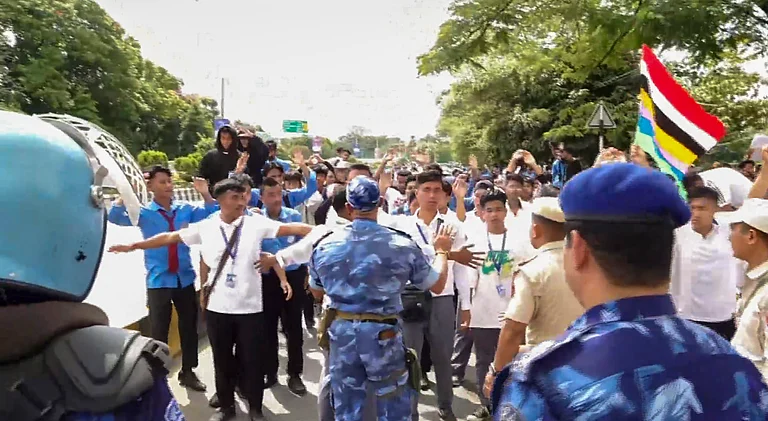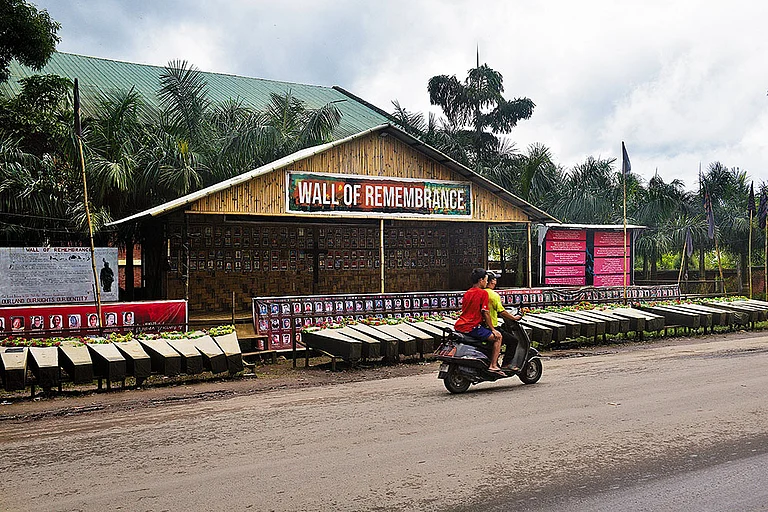Legends and Folktales have woven themselves into the cultural fabric of Manipur for centuries. The oral tradition of sharing these stories is rich in this North-Eastern state, but it comes with a downside. In Manipur, recounting a folktale or observing a festival can spark conflicts of narratives, sometimes escalating to violence. An instance occurred on October 18th, 2023, when Chief Minister Biren Singh shared a story in the Ukhrul District. This tale, suggesting a fraternal bond between Nagas and Meiteis, led to both anger and confusion. The story parallels a traditional folktale, albeit with a crucial difference, featuring not just two but three brothers: Naga, Meitei and the Kuki. The legend thus goes as follows:
“Once upon a time there was a jumping match across a river among the three sons of the same ancestor. The eldest, clearly the strongest, jumped the river and landed on the topmost part of the hills. The second, nearly as good, cleared the river but his foot slipped, and he landed on the slopes of the hills. The youngest, however, tumbled and fell on the river. The eldest became the Nagas, the second became the Kukis and the youngest the Meiteis”
Nandita Haksar in her timely new book “Shooting the Sun: Why Manipur Was Engulfed by Violence and the Government Remained Silent’ explains with verve and courage the complexities that have engulfed this erstwhile princely state from the time it merged with the Union of India on September 21, 1949, to the present time when there is a blood bath going on which started on 3rd May 2023. The stories of Manipur that this book recounts are violent, cruel and infused with unadulterated savagery. Nandita Haksar is a human rights lawyer, teacher, campaigner and writer who has worked on North-East India for over three decades and this is her recent book on this issue.
The state of Manipur has a peculiar topography with ‘Meiteis’ predominantly living in the valley and ‘Kuki’s’ inhabiting the hills that surround it. The Kuki’s are a tribal community that has enjoyed the Schedule Tribe status from the time of the Britishers and Meiteis are non-tribals who are demanding to be included in the list of Schedule Tribes for a long time, from 1981 and this demand of theirs irks Kukis the most. In her book Nandita Haksar explains as to why Kuki’s are not fine with Meiteis having the ST status. Meitei identity movements, she says have had an effect of the counter mobilization by the tribals, who have felt threatened by the dominant communities' actions over the years. The growing identity mobilization of the Meiteis has induced fear in the minds of the minority tribals who are numerically insignificant and politically less dominant. In short, much of the politics in this state is centered on the question of preserving one's identities and this holds true for both the communities.
In June 2022, the tribals reacted sharply against the Chief Minister Biren Singh for allegedly saying that ‘land belongs to mother nature and not to any particular community’. The tribal organizations asserted that land is the identity for the tribal communities, and they had a sacred connection with it. The Meiteis on the other hand argue that before the merger agreement of the Union of India in 1949, the British had designated the Meiteis as a 'tribe amongst tribes'. According to them, they were merely asking for a restoration of that status.
The tribals say that it was the Meiteis themselves who had refused to be included in the Schedule Tribes post-Independence since they considered themselves superior to the tribals. However, the Meiteis point out that only some Hindu Meiteis refused ST status and that those practicing the ‘Sanamahi religion’ (the ancestral religion of Meiteis) were not asked.
Within the broad community of Meiteis are included the Meitei Muslims as well as the Meiteis who did not convert to Hinduism, who assert their pre-Hindu identity and follow their ancient Sanamahi religion. It is important to remember that Kukis are predominantly Christian and many reporters, especially outside Manipur, described the recent violence as a communal clash between the Hindu Meiteis and the Christian Kukis. However, the first clashes were on the Meitei churches and the Meitei Christian community living in the Churachandpur, the Kuki dominated hill district which suggests that this is not just a communal clash between these two communities. The testimonies of the Meitei Christians exposed the tension between ethnicity and religion, especially felt by the community. The speakers wished to emphasize that although they were Christian, they stood firmly with their fellow Meiteis on the issue of the integrity and unity of Manipur and that they did not support the demand of the Kukis for a separate administration, even though the latter were Christian.
In this timely book, Nandita Haksar explains that there is a mistaken belief among large sections of the mainstream policy and media community outside Manipur that this is a petty brawl between two ethnic groups in the “remote north-east” that can be resolved only if both sides make some concessions. This liberal imagination ignores the gross imbalance of social and political power between the Meitei and Kuki, specifically how the former enjoys greater agency in decision-making and discourse-setting process over the latter.
As the conflict rages on in Manipur, Nandita Haksar prescribes a remedy that can potentially restore back peace and normalcy to this strife-ridden state. She says that “People have lost their loved ones, their homes and their means of livelihood. Children have not been able to go to school, the youth attend college or university. The dreams of thousands lie shattered in burnt homes and relief camps. Unless every home destroyed is rebuilt, every vandalized religious structure restored, livelihoods given back, and until the children can safely go back to school, the youth can return to college, doctors can work again without fear, there can be no peace.”
(Saleem Rashid Shah is a book critic and an independent writer based in Kashmir. He tweets at @SaleemRashid176)


























